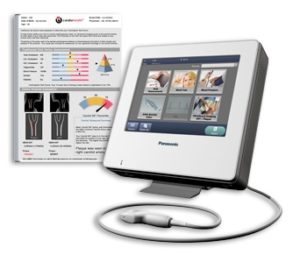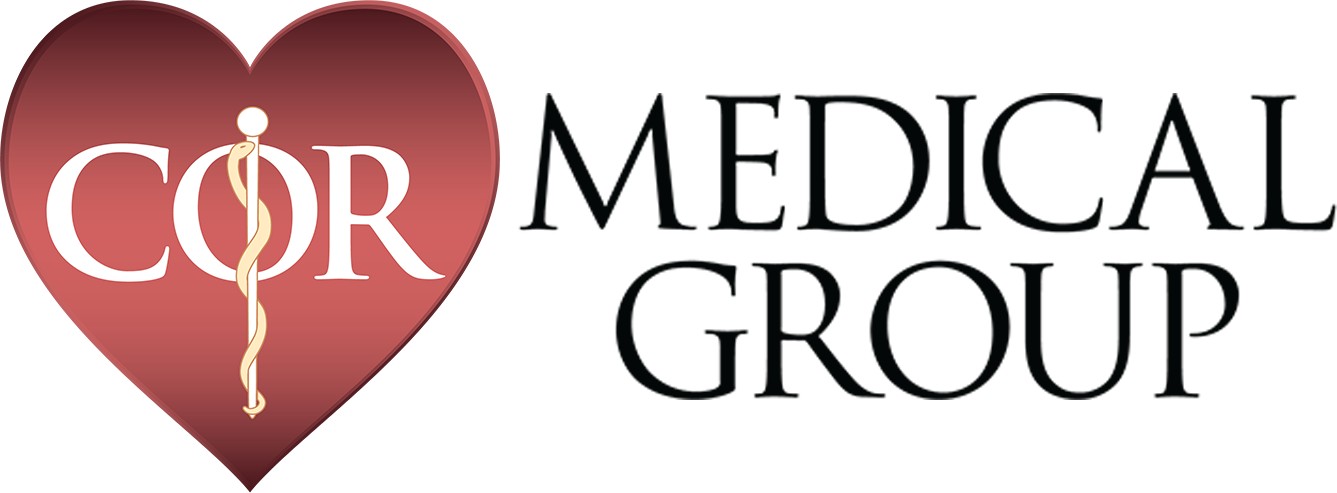Atherosclerosis Screening with Carotid IMT
CardioHealth® Carotid IMT Test
Imaging For Heart Attack Prevention
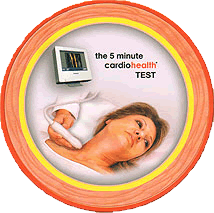 Los Angeles cardiologists Dr. Jeffrey Caren and Dr. Mark Urman now offer a safe, painless, FDA-approved test that can quickly screen for and monitor atherosclerosis – the plaque build up in arteries that is the underlying cause of heart attack and stroke. CardioHealth® is the latest state-of-the art technological advance in carotid IMT (intima-media thickness) ultrasound that allows your physician to get a direct measurement of how healthy your arteries are.
Los Angeles cardiologists Dr. Jeffrey Caren and Dr. Mark Urman now offer a safe, painless, FDA-approved test that can quickly screen for and monitor atherosclerosis – the plaque build up in arteries that is the underlying cause of heart attack and stroke. CardioHealth® is the latest state-of-the art technological advance in carotid IMT (intima-media thickness) ultrasound that allows your physician to get a direct measurement of how healthy your arteries are.Am I Really as Healthy as I Look or Feel?
Vascular disease can be seen even in its earliest stages before it causes symptoms or starts to block blood flow. Much more sensitive than regular carotid ultrasound vascular imaging (or Carotid Duplex which can only tell us if there is already significant plaque or blockage in the carotid arteries), Carotid IMT (CIMT), has been shown to correlate with future risk of stroke and heart attack. CIMT results allow us to assess how old your arteries are.
The evidence is clear that early signs of plaque in arteries signals future heart trouble.
Click here to learn more about arteries, how to assess how healthy your arteries are and the revolutionary CardioHealth® technology.
It’s All About Your Arteries
Why is CIMT important?Heart disease is the number one killer of American men and women, killing more people (500,000 a year) than all forms of cancer combined. About every 25 seconds, an American will suffer a heart attack and about every minute someone will die from one. About every 40 seconds, an American will suffer a stroke. In 50 percent of those with coronary artery disease, their first symptom is a heart attack or sudden death.
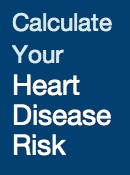
Tragically, often the first symptoms of plaque build-up in arteries is a heart attack or stroke. Many people who die unexpectedly of heart disease have not experienced prior symptoms of the disease (close to two-thirds of women and about half of men who die from heart attacks). Many who suffer heart attacks do not have very elevated cholesterol or other indicators of risk. In roughly half of those with coronary artery disease, their first symptom is a heart attack or sudden death.
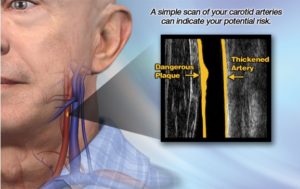
Your physician can use the results of your CIMT scan, in combination with your cardiac risk factors, to create an individualized action plan. This non-invasive test typically takes less than 10 minutes and can provide an early warning of atherosclerosis before any symptoms develop. CIMT quickly reveals the effects of all risk factors you have on the health of your arteries. Most importantly, if you find plaque or thickened arteries that are more prone to develop plaque, lifestyle changes and medical intervention can reduce the risk of heart attack and stroke. CIMT is imaging for heart attack prevention.
CIMT is an alternative to coronary calcium scans and does not expose the patient to any radiation. CIMT can be reduced by lifestyle modifications and therapeutic interventions. The FDA and NIH also accept CIMT (but not coronary calcium scanning) to follow patients for atherosclerotic disease progression.
What is CIMT? – A Painless, Non-invasive Test
The thicker the arterial wall, the greater the risk for plaque development and eventually heart attack or stroke. CIMT measures the thickness of the two innermost layers (intima and media) of the walls of the carotid artery (located in the neck). These layers tend to get thicker as one gets older, but if it is thicker than expected for your age, we know that you are more prone to develop plaque as abnormal thickening of artery walls is the first sign of plaque formation. Clinical studies over the last few decades have shown that after factoring for age, gender, and ethnicity, individuals with increased CIMT values have a greater risk of heart attack and stroke than those with CIMT values that are judged to be normal for the comparable group.
The CardioHealth® test is safe, painless, non-invasive and takes less than ten minutes. There is no exposure to radiation. No preparation is required for the CIMT test and patients can resume normal activities immediately following the test. Our trained sonographer or technician will apply a thick gel (similar to hairstyling get) to the skin of your neck. A transducer (small microphone-type of device) will be gently applied over the gel. The gel helps ultrasound waves get from the transducer, through the skin so they can bounce off the carotid arteries. These harmless waves create “echoes” that are reflected back to the transducer which converts it to digital electronic signals that are processed by CardioHealth’s® sophisticated ultrasound machine into pictures that allow your doctor and you to “see” your carotid arteries. The test is done on both sides of the neck.
A report will be generated for you and your doctor that will state your actual CIMT measurement, will compare your CIMT results with others of your age and gender, and state how old your arteries appear with a comparison of your risk for heart attack or coronary death to others of your age and gender.
Why look at the neck when you are interested in the heart?
The carotid arteries provide a “window” to the coronary arteries as they have similar risk factors for atherosclerosis. Carotid artery atherosclerosis provides insight to the risk and existence of coronary atherosclerosis in an individual. In fact, the relationship between the atherosclerotic burden in a carotid artery and a coronary artery is the same as between any two coronary arteries. Thus, carotid atherosclerosis measurements also reflect the degree of arterial plaque in the heart and rest of the body. CIMT is an independent predictor of future cardiovascular events, including heart attacks, cardiac death, and stroke. Click here to learn more about coronary artery disease.
How Old Are Your Arteries?
The CIMT test provides an estimate of how “old” your blood vessels are in comparison to your actual age. It is reported as a percentile (not percentage) so if your CIMT is at the 50th percentile your arteries are “average” thickness for your age group. The higher your percentile, the “older” your arteries are and the lower your percentile score, the “younger” your arteries are compared to other adults in your age group.
You know your age in calendar years but are your arteries as young as you feel? Part of the final CIMT scan report compares your CIMT results with others of your age, gender and ethnicity. In other words, the CIMT test allows you to know how “old” your arteries are or your “vascular age.” Early detection of your arteries aging faster than expected may alert you and your doctor of the need for more aggressive management of risk factors associated with heart disease and stroke. Your doctor might prescribe medications to lower blood pressure and/or cholesterol, have you take aspirin and encourage you to have a healthier diet and exercise more.
Who should have the CIMT Test?
This screening test can be performed between the ages of 25 and 80 but generally should be considered in men over age 45 and women over 55 with one or more of the following risk factors:
- Family history of heart attack and/or stroke
- Abnormal cholesterol levels (high LDL or “bad” cholesterol, low HDL or “good” cholesterol, or elevated triglycerides)
- High blood pressure (hypertension)
- Smoking (former or current)
- Diabetes or metabolic syndrome
- Overweight or physically inactive or unhealthy lifestyle
- Sleep apnea
- Chronic inflammatory disease or disorder (such as rheumatoid arthritis, lupus, psoriasis, HIV, inflammatory bowel disease)
- Prior abnormal CIMT test to help follow the effectiveness of risk-factor modification
- The above risk factors as well as aging are contributing factors to an increased carotid intima-media thickness as well as risk for heart attack and stroke.
Is the CIMT Test Covered by Health Insurance?
To date, Medicare and most private insurance plans do not routinely pay for CIMT testing. Yet, CardioHealth® is a safe, FDA-approved test that is recognized as a valid means for detecting subclinical vascular disease to assess risk for heart disease. We have priced it comparable to coronary calcium scanning. Call our office to discuss opportunities for reduced fees that might be available.
Prevention Is The Best Treatment!
Early Detection Can Lead to Early InterventionPlaque typically begins to form years (or even decades) before a heart attack or stroke occurs. Cholesterol is one of many factors that contribute to plaque build up over the years. Generally, the more cholesterol in plaque, the more unstable and softer the plaque is, or the more “vulnerable” it is. Heart attacks and strokes are most often caused by rupture of vulnerable arterial plaque.
Vascular plaque and atherosclerosis needs to be stabilized to reduce the risk of heart attack or stroke. Optimal treatment will also prevent further growth, and quite possibly reverse the process. Early plaque is much more common than most realize (up to one-third of seemingly healthy people in their twenties can have early plaque formation in their arteries).
It’s never too late to reduce your risk for heart attack or stroke. Your physician can use the results of your CIMT scan, in combination with your cardiac risk factors, to create a heart-healthy action plan that may include lifestyle changes, medications, specific treatments and/or further tests, which will:
- Reduce your risk for heart attack and stroke
- Maintain your healthy heart
- Reverse existing hardening of the arteries and decrease the risk for a second heart attack, stroke, or other cardiac event
CIMT is an alternative to coronary calcium scans and does not expose the patient to any radiation. Soft plaque that has yet to calcify in coronary arteries may lead to a seemingly normal coronary calcium scan. CIMT can detect arterial wall thickening and early plaque before it is calcified thus some feel CIMT is the best method to detect early disease. CIMT can be reduced by lifestyle modifications and therapeutic interventions. Yes, advanced arterial wall thickening or increased CIMT has been shown to be reversible if treated aggressively and appropriately. The FDA and NIH also accept CIMT (but not coronary calcium scanning) to follow patients for atherosclerotic disease progression. So follow-up CIMT testing can track your progress as you work to reduce your risk.
Dr. Mark Urman is certified as a SHAPE provider by the Society for Heart Attack Prevention and Eradiction, an education-based organization that is dedicated to ending the threat of heart attack through the use of imaging techniques to detect the earliest signs of coronary heart disease.
Request a CardioHealth® CIMT appointment
Call us at (310) 659-0715 between 8:30 a.m. and 5 p.m., Monday through Friday.


